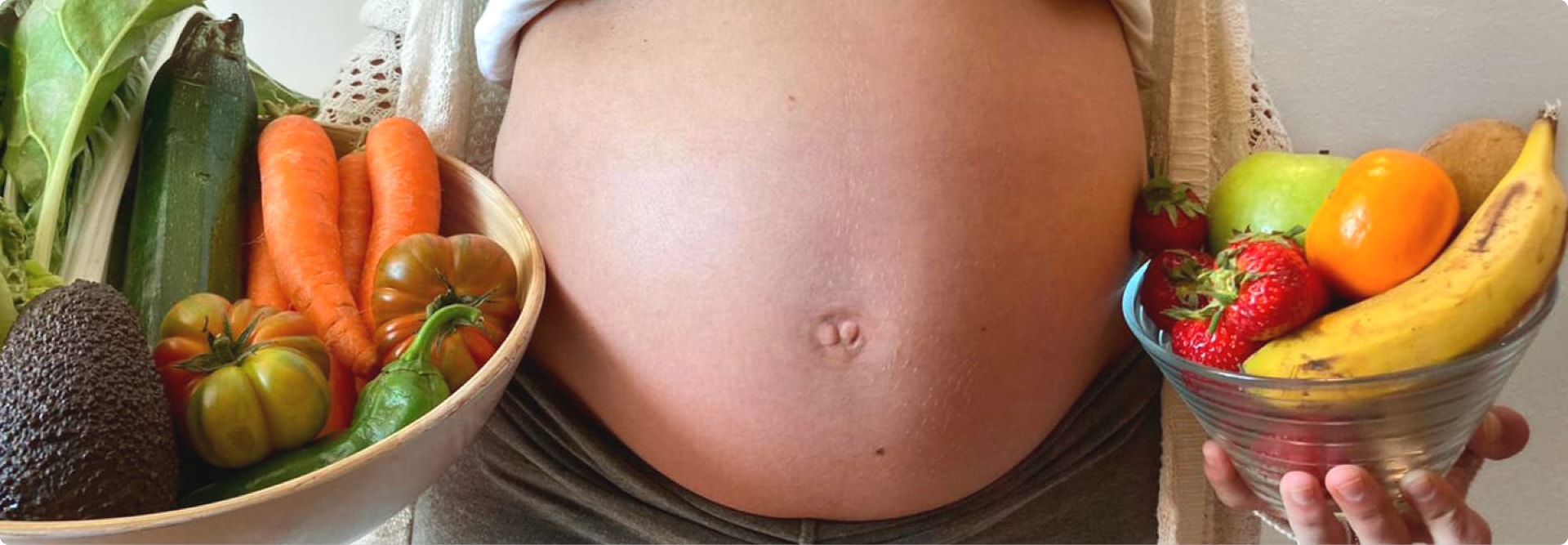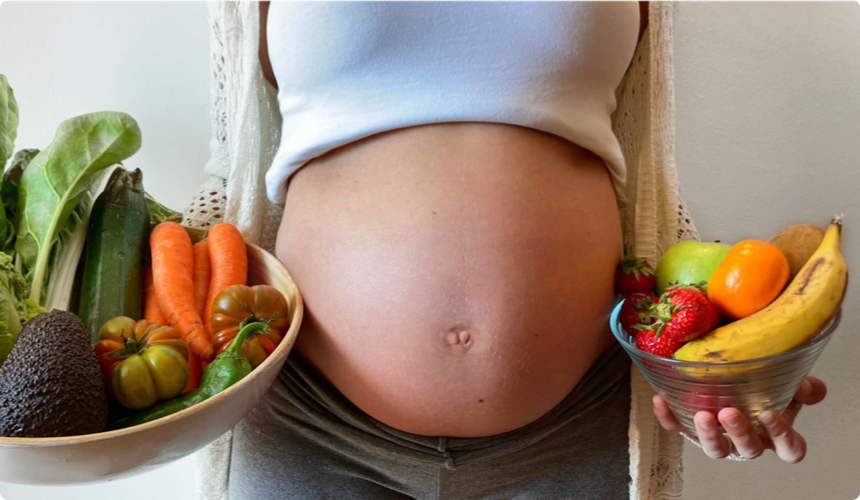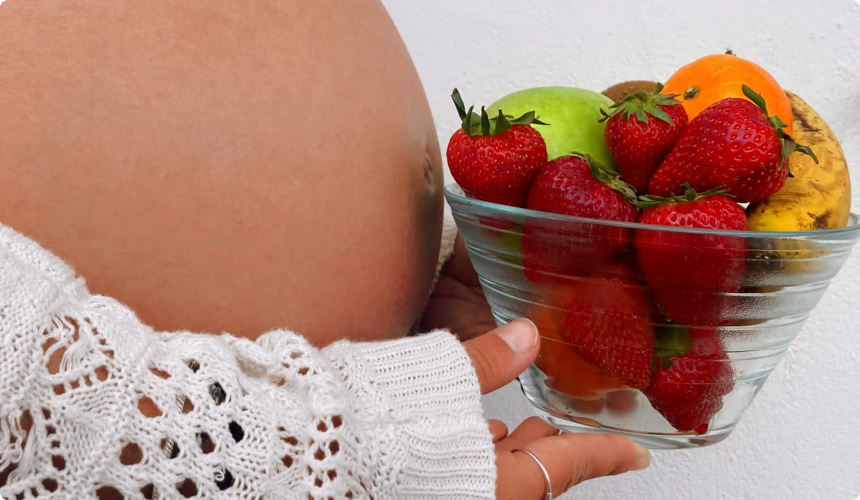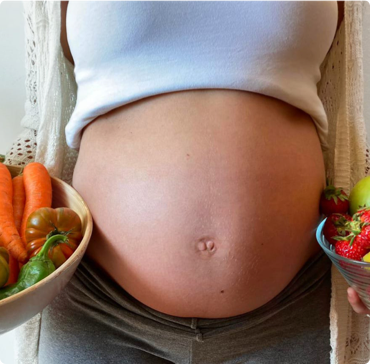Pregnancy and Birth
YOU WILL PREGNANT
Improve nutrition during pregnancy

During pregnancy it is necessary to follow a healthy diet. It will contribute to the good development of the future baby.
In addition, improving nutrition is a good opportunity to start healthy eating habits that can be established and maintained in the future.
Body weight gain during pregnancy that is considered normal is between 11 and 16 kg, if the woman has a normal weight before pregnancy, although if it is not strictly observed, you can also have a good pregnancy and have a healthy baby.
- You must eat fruit, vegetables, vegetables, legumes, dried fruit and preferably whole grains (bread, pasta, rice, potatoes...) and olive oil.
- It is necessary to eat moderate amounts of lean and white meat, fish, eggs and dairy products (milk, natural yoghurt and cheese)
- You should avoid eating pastries, cookies, sugary drinks, sausages, red and processed meats and salty snacks.
- If you are a vegetarian (both ovo-lacto-vegetarian and strict vegetarian or vegan), the systematic supplementation of vitamin B12 is advised, which in the diet is only found in foods of animal origin (supplement of 25 µg/day or 1000 µg three days per week).
- You should preferably drink water (approximately four to eight glasses a day).
- Alcoholic beverages must not be consumed. Its consumption can affect the normal development of the fetus.
- It is necessary to moderate the consumption of salt, and this must be iodized salt.
- Energy drinks are totally discouraged.
- Iron supplements with vitamin C (orange, kiwis, etc.) are recommended to improve its absorption. These should not be mixed with milk.

- Spreading the daily intake in five or six not copious meals will help you feel better. There is no need to "eat for two". Try to sit at the table, chew well and enjoy the food without rushing.
- Various cooking techniques can be used, but you should always moderate those that involve an excess of fat. Both for cooking and dressing it is convenient to use virgin olive oil.
- Five portions of fruit and vegetables should be eaten a day. If they are eaten raw, they must be washed well with plenty of water.
- You must consume fish twice a week, which has omega-3, necessary for the proper development of the fetus, but you must avoid swordfish or emperor fish and tuna because of their mercury content.
- It is recommended to eat dairy products, preferably skimmed, but you must avoid fresh or soft cheeses (feta, camembert, mascarpone, brie, cottage cheese, Burgos cheese) if the label indicates that they have been made with raw milk, because they may contain Listeria , a microorganism that can cause serious harm to the fetus or baby.
- Cook meats and chicken sufficiently, leaving no raw parts, as raw meat can contain toxoplasma, the parasite that causes toxoplasmosis, a disease that can affect the development of the fetus.
- Respect the expiration dates of foods that are kept refrigerated, especially of lightly cured sausages. Refrigerated pates and smoked peso should be avoided. Listeria bacteria can grow in these foods.
- Do not eat raw any food of animal origin, such as eggs, shellfish, fish (sushi) and meat. Clean kitchen surfaces and utensils after handling raw food, which will help prevent infections from germs like Salmonella, Campylobacter and E. coli.
- You can take up to 200 mg of caffeine a day: a coffee bar contains 60-100 mg of caffeine, a cup of tea, 70 mg.

It is recommended:
- Avoid copious meals. Better to have frequent, light and small meals.
- Reduce foods high in fat.
- Cold foods are usually better tolerated than hot foods.
- Avoid drinking fluids while fasting.
- Avoiding foods that may be less or worse tolerated such as coffee, tea, high-fat foods, spices, etc.
- Avoid exposure to smells and textures that cause nausea.
If dietary measures do not control the symptoms, you can resort to ginger treatment, acupressure or pharmacological treatment (in this case, you must consult your healthcare professional: midwife or obstetrician).
It is advisable to:
- Eat food in small amounts and frequently, little by little.
- Avoid fatty foods, spicy foods and those that can irritate the stomach lining, such as citrus juice, tomatoes, caffeinated or fizzy drinks.
- Avoid alcohol and tobacco.
- When eating, sit with your back straight, to avoid pressure on your stomach.
- Do not wear tight clothing that compresses the abdominal area
- Allow between one and two hours to pass between the intake of food and the time to lie down or go to sleep.
- It is recommended to raise the head of the bed between 15 and 20 cm.
If no improvement is achieved, drug treatment may be prescribed.
It is recommended:
- Eat foods rich in fiber (legumes, vegetables, natural fruit, dried fruit, whole foods...).
- Increase water intake.
- Eat one or two tablespoons of corn or flax or sesame bran mixed with salads, yogurts, etc.
- Drink warm or hot water while fasting.
- Increase physical activity such as walking, swimming, water exercises, yoga, etc.
- Have a correct bowel habit: allocate the necessary time and defecate when there is a need to do so and do not leave it for later.
You should avoid taking laxatives except for medical indication.
The recommendations for eating food in good conditions and avoiding infections and diseases that can affect the fetus are:
- Cleaning: Hands must be washed before and after handling food.
- Cooking: A temperature that reaches 75°C inside the food is already considered safe.
- Separate: Avoid contact between raw and cooked foods.
- Refrigerate: Prepare food shortly before consuming. Do not leave them at room temperature for more than two hours. Store them in the fridge or freezer.





